|
||||||||||
| Home Nation World Business Opinion Lifestyle ChinAfrica Multimedia Columnists Documents Special Reports |
|
||||||||||
| Home Nation World Business Opinion Lifestyle ChinAfrica Multimedia Columnists Documents Special Reports |
| ChinAfrica |
| Drivers of Change |
| Chinese electric vehicles advance African countries’ green mobility |
| By Xia Yuanyuan | VOL. 16 June 2024 ·2024-06-11 |
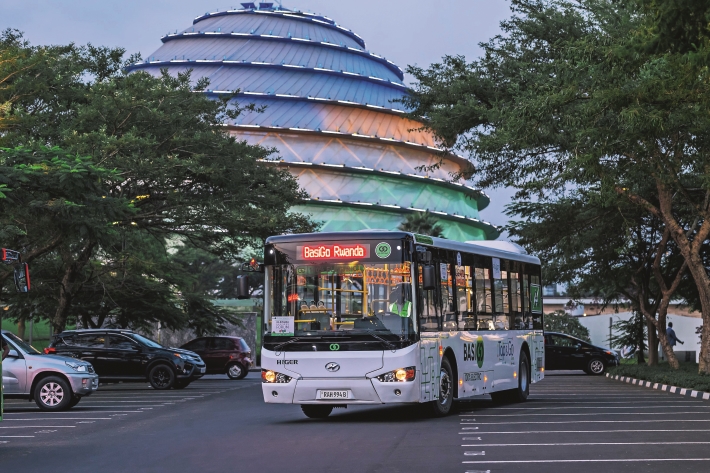
A Chinese-made electrical bus is seen on a street in Rwanda (BASIGO KENYA)
It’s been roughly one year since BasiGo, a local e-mobility startup, introduced electric buses in public transport on a trial basis in Kigali, Rwanda’s capital. The green line has helped to reduce carbon emissions and decreased travel time due to an increase in the frequency of buses. BasiGo plans to introduce 200 buses on the streets of Kigali after the end of this trial period.
The Kenya-based e-mobility startup assembles buses locally by using parts which are designed by Chinese electric vehicle (EV) maker BYD. Under the partnership between BasiGo and BYD, 17 electric buses were put into operation in Nairobi last year. According to Jit Bhattacharya, chief executive officer of BasiGo, each electric bus reduces up to 50 tonnes of carbon emissions a year.
“China is a global leader in electric mobility, inspiring African countries like Kenya in their quest for a dramatic shift to less carbon-intensive modes of transportation,” said Moses Nderitu, chief revenue officer of BasiGo. The company promised to introduce more buses to other parts of the country once repair and charging stations are developed.
Kenya is not the only example. According to CleanTechnica, a clean energy and cleantech news site, over the years, Chinese EVs, including scooters and three wheelers, are exerting increasing influence in Africa.
In the past, vehicles were mostly imported from Japan and Europe. But now, more and more Chinese EVs can be seen on the roads. CleanTechnica believes that the Chinese market is the best source of affordable EVs for Africa.

An electrical motorbike driver takes a battery from a battery swap station in Ghana (SHELL FOUNDATION)
Green transportation
Unlike traditional vehicles, EVs can reduce carbon emissions because they run on rechargeable electric batteries. Therefore, as the world moves from “global warming” towards “global boiling,” it is essential to embrace EVs as a means to mitigate carbon emissions. As Africa grapples with environmental challenges and seeks sustainable transportation, the integration of EVs into Africa’s transportation network could reduce carbon emissions and open new avenues of economic growth.
“EVs are getting popular in African countries because they align with the African Union’s focus on sustainable development,” Ehizuelen Michael Mitchell Omoruyi, executive director of the Centre for Nigeria Studies of the Institute of African Studies at Zhejiang Normal University, told ChinAfrica. The African countries that are not oil-rich see the development of EVs as a way to reduce their consumption of fossil fuels and hence reduce their dependence on imports for energy, he added.
According to data from the Africa E-Mobility Alliance, as of 2023, electric scooters and three-wheelers dominate Africa’s e-mobility landscape, constituting a remarkable 79 percent of all EV variants, while electric light-duty vehicles make up 20 percent, and electric buses account for 1 percent.
At present, Chinese car companies such as BYD, Geely, Dongfeng, Great Wall, SAIC, and Jianghuai have all introduced their EVs in Africa.
In Ghana, several auto dealers and startups sell more than 20 models of Chinese-made EVs in the local market, including cars, SUVs and minivans, while in Rwanda, Geely’s Geometry E car offers a cost-effective choice to consumers. The electric trucks sold in Zimbabwe and Kenya are all from BYD. These trucks are widely used in the local logistics and transportation industries. Maxus eDeliver 3 and Dongfeng Sokon EC3 have become star vehicles in the South African market, with sales increasing year by year.
According to Alex Mohubetswane Mashilo, a visiting scholar at the Southern Centre for Inequality Studies of the University of Witwatersrand of South Africa, compared to European and American brands, Chinese electric cars are more affordable, which gives Chinese brands an edge in taking a dominant position in the African market in the future.
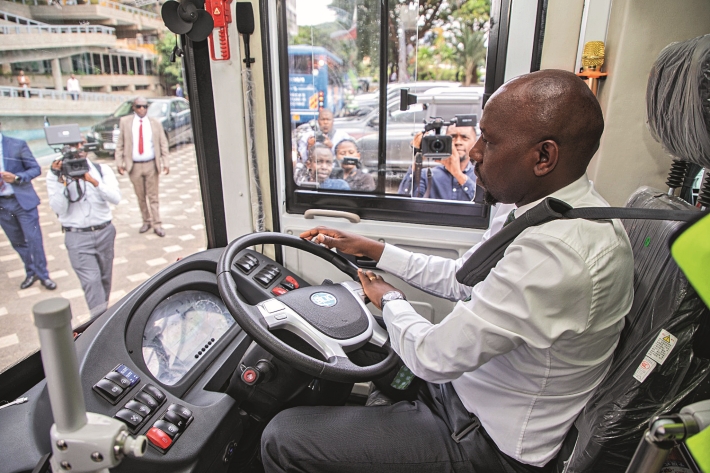
A driver operates an electrical bus assembled locally in Kenya (BASIGO KENYA)
Challenges ahead
CleanTechnica believes that the African continent has the possibility to bypass the era of fossil fuel vehicles and directly enter the era of electric transportation. However, judging from the actual situation at this stage, the realisation of vehicle electrification in Africa has many challenges.
“Africa is currently in the initial stage of introducing EVs,” Xu Haitong, vice chief engineer of the China Association of Automobile Manufacturers, said. Since some Chinese companies are planning to manufacture these electric cars locally, they might face the challenge of lack of government policy support and incentives for the manufacturing industry, high import duties for EVs, unstable power supply and inadequate charging infrastructure.
At present, the proportion of EVs in the entire African auto market is still low. According to the International Energy Agency, throughout Africa, electric cars are still rare, accounting for less than 1 percent of total car sales. The EV market in Africa is relatively small and needs to be further expanded to increase consumer awareness and acceptance.
“Although the region is rich in key mineral resources such as cobalt, nickel, and lithium used to manufacture EV batteries, it is difficult for it to develop a robust automobile industry and battery industry,” said Cui Dongshu, secretary general of the China Passenger Car Association. The most it can do is to run some purification projects for battery raw materials, which means Chinese car companies can only assemble vehicles in Africa rather than producing them locally, he added.
According to Xu, African governments have realised the broad prospects of EVs, but due to constraints in funding, consumer acceptance, and infrastructure capabilities, it is difficult for Africa to quickly realise electric transformation.
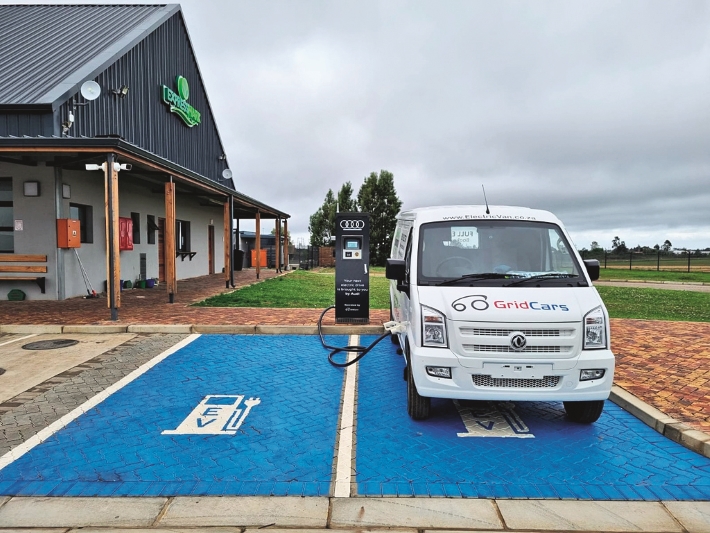
An electrical light truck is being charged in South Africa (ENVIRO AUTOMOTIVE)
Policy support
Most African countries have adopted measures to support the development of the EV industry. Several governments have big plans for expansion to help to ease urban air pollution, and to facilitate the rollback of costly fuel subsidies.
The Kenya National Energy Efficiency and Conservation Strategy set a key target of raising the ratio of new energy vehicles (NEVs) in total annual vehicle imports to 5 percent by 2025 by providing incentives such as lower import duties on electric cars, bicycles, and tuk-tuks. Ghana, Rwanda, Seychelles and Mauritius have also cut import fees. Egypt plans to manufacture 20,000 EVs domestically per year starting in 2023. Namibia wants 10,000 EVs on the roads by 2030.
Meanwhile, dozens of startups are working to capitalise on those ambitions, including many focused either on buses or on motorcycles and tuk-tuks (and in one case, fishing boats on Lake Victoria). In Kenya alone, there are at least 50 startups working on developing electric two- or three-wheelers, according to the United Nations Environment Programme (UNEP).
South Africa’s Green Transport Strategy (2018–2050) proposes that 5 percent of government public sector vehicles should use clean fuels by 2025, with an annual increase of 2 percent after 2025. The strategy also proposes working with the private sector to expand the number of EV charging stations. In May 2021, the South African Department of Trade, Industry and Competition released a document on the development of NEVs in South Africa to solicit public opinions, which establishes a clear policy foundation that will enable the country to adopt a long-term strategy that will position South Africa at the forefront of advanced vehicle and vehicle component manufacturing.
Egypt has a plan to build and operate 3,000 EV charging stations in Cairo, Giza and Alexandria provinces and Sharm el-Sheikh, and on major highways within 18 months starting in April 2022, with the ultimate goal of building 42,000 charging stations across the country. The government has restarted the state-owned automobile company El-Nasr and plans to invest 2.5 billion Egyptian pounds ($53.3 million) in cooperation with foreign automobile companies to establish a domestic EV production line. It plans to increase the annual output of EVs to 53,000 units in three years.
Bright prospects
According to Mordor Intelligence, a market intelligence and advisory firm, Africa’s EV market size is estimated at $15.8 billion in 2024, and is expected to reach $25.4 billion by 2029. The UNEP also expects electric and traditional two- and three-wheeler sales in Africa to increase substantially by 2050.
A 2022 analysis by McKinsey and the Shell Foundation on Ethiopia, Kenya, Nigeria, Rwanda and Uganda shows that by 2025, the sales volume of EVs in these countries may reach 340,000 to 820,000. It is believed that Chinese EV enterprises will definitely be able to discover business opportunities in it.
“Chinese auto enterprises have relatively strong technical strength and innovation ability in the field of NEVs. The technologies cover pure electric, hybrid and hydrogen fuel cells, etc., and the industrial chain is mature,” Cui said. It is necessary to seize the opportunities presented by the continuous improvement of the African economy and the gradual improvement of infrastructure to strengthen the cooperation between China and Africa in the field of NEVs, he said.
NEV and EV
In China, the term new energy vehicle (NEV) refers to vehicles powered either fully or predominantly by electricity. NEVs include pug-in hybrids, full-battery electric vehicles, and fuel-cell electric vehicles. Electric vehicle (EV) refers to vehicles powered by batteries rather than an internal combustion engine. While the term EV is commonly used to refer to four-wheal vehicles – cars, buses and trucks - other variants include two-wheelers (scooters) and three-wheelers (rikshaws).
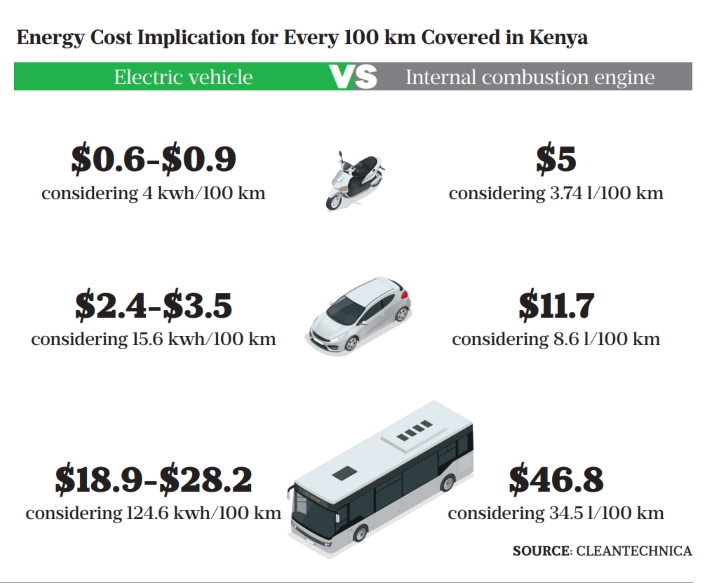
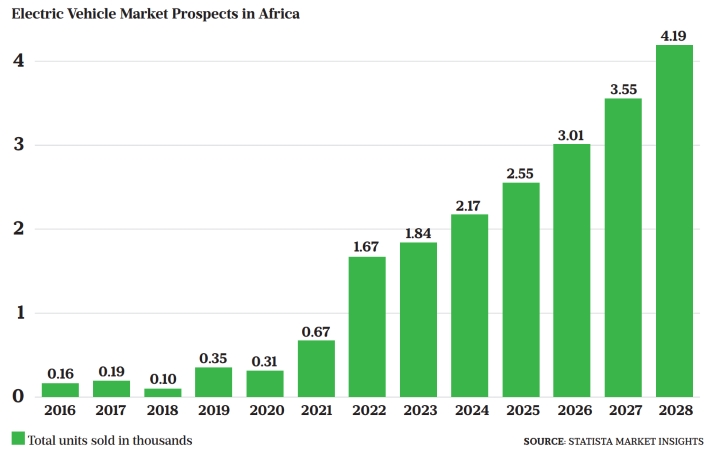
|
||||||||||||
| About Us | Contact Us | Advertise with Us | Subscribe |
| Copyright Beijing Review All rights reserved 京ICP备08005356号-5 京公网安备110102005860号 |